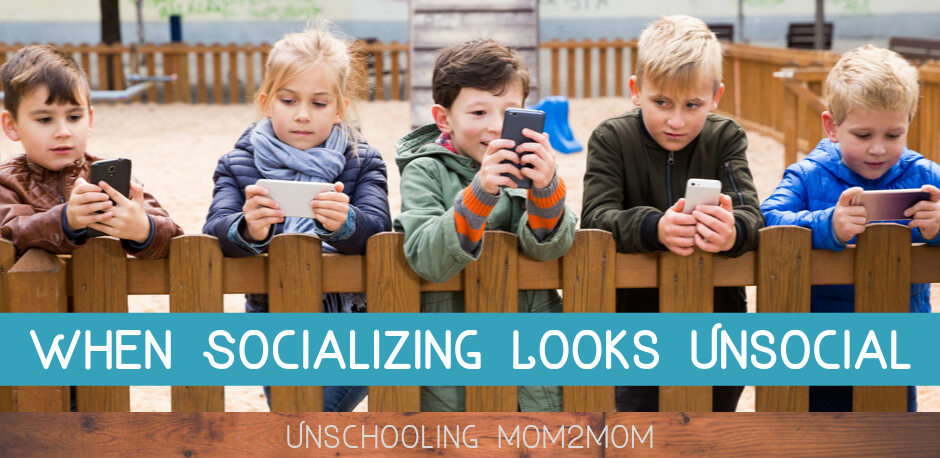When Socializing Looks Unsocial
Michelle Conaway shows us how technology may be changing how we view socialization.
Parents may not be aware of all the skills kids are learning while they're playing games and interacting with friends online.
It is hard to believe, but one of the most asked questions of homeschoolers is still about socialization. How will they learn to move around in social situations if they are stuck at home all day long?
It is a tired-out question for homeschoolers and one that most of us have learned to laugh about. Homeschoolers have always tended to gravitate toward activities that build social skills.
With the recent technology explosion, however, the subject of socialization has been up for debate in the world at large. Even among homeschooling parents, how and when to “socialize” our homeschooled youth has become an ongoing conversation.
- Does socializing our kids mean dragging them to park days, even if they don't want to go?
- Does it mean we force them to participate in outside events, when they would rather be sitting at their computer?
- Has the way we socialize in the world changed?
- What does socialize mean anyway?
The Merriam-Webster dictionary defines socialize as:
"to talk to and do things with other people in a friendly way; to teach (someone) to behave in a way that is acceptable in society."
Times Are Changing
Years ago, the only way to socialize outside of the family was to physically go out into local surroundings. Park days, homeschool-events, teen jobs and volunteer efforts all occurred outside of the home.
Today, the Internet is the new playground, with gaming events, volunteer options and even careers opportunities for kids to explore. Our kids have the entire world at their fingertips and no longer have to rely on demographics as a means of meeting like-minded friends and learning how to “behave in a way that is acceptable” on a global scale.
And yet, many people still believe that phones, tablets and computer screens are turning our children into social drifters. Many of us want our kids to get out into the community and not spend so much time in front of screens. We may feel that that are being unsocial by spending so much time at their computers. It may seem logical to us that they should get out with local kids and do other things with much of their time.
But maybe we need to rethink this.
The world is changing and social media and online communication is where society is focused these days. Our kids instinctively know this and gravitate towards online interaction, which many times turns into real life gatherings organically. Both of my sons have enjoyed meeting people online, first to discover common interests and then for in-person gaming activities.
Unschooling Guide: Technology
The 25-page full-color magazine-style PDF will help you dive a little deeper in this concept of embracing technology.
Society resists everything that's new - and we've absorbed a lot of the messaging against technology. Learn more about what that means so you can hop off the mainstream anti-kid conveyor belt, and do what's best for your family.
This Guide will help you!
Skill Development
Perhaps many parents don't understand the socialization skills their kids are gleaning from their time on social media such as Skype, gaming platforms and Facebook. The array of options that are available to our kids today demands a certain respect. Kids are learning through chats, live Skype conversations and collaborating on games to get along with others and create and maintain relationships. They're learning to create and share their work, assist others with skills they know a lot about and monitor their tone of voice and choice of words. They are learning to brainstorm possible responses to potentially adversarial situations and effectively handle online conflict.
Approach with Curiosity
Let's put our focus on connecting with our kids and looking for the value in what they are interested in instead of fighting this new way of socializing. We can find out more about it.
- Why do they love that game they spend so much time on?
- Have they met friends from around the world that they play with?
- What are they learning on Facebook?
- Have they read any great articles posted there?
- Who are they following and why?
- What skills have they learned through collaborating on games?
We may be pleasantly surprised with what we discover. Perhaps they've learned some coding or graphic design. Maybe they’ve found writing tips on Facebook. These are the jobs of the future and learning to work with others online is key to mastery of these skills.
Prioritizing Relationships
Gaining our kids' trust is so valuable. When they feel that their interests are valued, they are much more likely to open up and share with us what they are doing and learning. It's fascinating to see the connections they make. Through gaming, my boys socialize with friends from around the world. They're learning what it's like to live in a global society - a concept foreign to many parents.
When we connect with our kids and genuinely appreciate what they are discovering through their use of phones, computers and tablets, we begin to see that they are learning valuable skills that will usher them into the future, shaping them into productive adults who are ready for our changing world. A relationship free of distrust and criticism goes a long way towards helping our kids open up about the what, when and why of their online activity. Being a willing partner to your child around screen time helps them develop the skills needed to communicate effectively and solve problems in the information age. As a trusted partner, our opinions and suggestions matter to our kids and we become a valuable influence to their online life. We are in a position to help them navigate the social ups and downs as well as help propel them forward into an unknown world.
Society would have us believe that it's unsocial for our kids to sit at a computer for extended amounts of time. But socialization today means something different than it did just a few short years ago. What was true then is no longer true today. Keeping an open mind and strong connection with our children will help them navigate the new social norms and make way for the future of communication in the technology age.
Michelle Conaway lives at the beach with her husband and sons. She coordinated the wildly popular Texas Unschoolers Conference every spring (pre-Covid) and founded the Facebook groups: Texas Unschoolers ' and Creative Unschooling Kids.
More Unschooling Resources about Kids & Technology
- Unschooling Mom2Mom Podcast: Unschooling & Technology
- Collection of blogposts on Unschooling, Technology, Videogames
- Embracing Minecraft
- Too Much Technology












